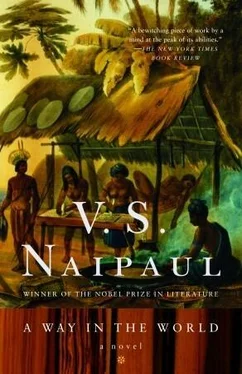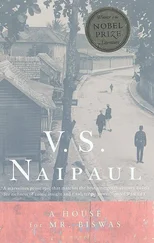Belbenoit — one of the senior clerks who sometimes checked my certificates — didn’t have this cover. He was a middle-aged “coloured” man. On both sides he would have been of mixed race for some generations; he was fair-skinned. He had no particular qualifications, but he didn’t think he had done well enough. Though every kind of racial assumption showed in his own querulous face, he felt he had been discouraged for racial reasons from aiming higher: at the time when he had entered the service, the best jobs were reserved for people from England. That was no longer so; but the changes had come too late for Belbenoit. He was famous in the office for being a disappointed man; and people treated his unhappiness like an illness, though it was no secret that Belbenoit (with all his old assumptions) felt he hadn’t had the treatment due to his fair colour, and felt his position in the office was in the nature of a racial disgrace.
His unlikely ally in the office — in office politics, and in representations of various kinds to the civil servants’ council — was Blair. Blair was a black giant, smooth-skinned, erect, with powerful shoulders. His manners were perfect; he could be very serious; he could also laugh easily, but always with control. He had an immense confidence. He came from a purely black village somewhere in the north-east of the island. This made him unusual: he didn’t have the combativeness and nerves of black people who had grown up in mixed communities. At the same time, because of that isolation, Blair had started school late. But he had made up for that. He was already a senior clerk, and everybody in the office knew he was studying now for an external degree of some sort, looking for the qualifications that Belbenoit never had. Blair sometimes checked my certificates. That very big man had the tiniest and neatest initials: they spoke to me of his ambition and strength.
Blair was courtesy itself to me; but I felt about him that, though we met with ease in the government office, there was much in his background I could never get to know. That all-African village in the north-east, isolated for some generations, without Indians or white people, would have had its own subterranean emotions, its own faith and fantasies. Blair no doubt felt the same about me; my Indian and orthodox Hindu background might have seemed to him even more closed. But in the neutral ground of the department we didn’t have to worry about these home matters; we got on, as far as we had to get on. In a civil service way Blair was perfection — and not without the disquietingness of such perfection. Just months out of school, and having only that experience to judge outsiders by, I thought of him (in spite of Belbenoit’s apparent alliance with him) as a kind of head boy: someone who could be one of the boys and at the same time represent authority.
He lived out what I felt about him then. Seven years later he abandoned the civil service, gave up that fine career, abandoned that restrained departmental demeanour, and went into local politics. He judged the moment well. He shot up, and then, in a decolonizing world, he rose and rose. He was to have an international career. Nearly twenty years later we were to meet in an independent East African country. He had gone there to work for the local government on a short-term contract. He would have been especially pleased by this assignment in independent Africa; but it was there, not long after we had met again, that he was to die, murdered by the agents of some wild men in the government who felt threatened by him. For two days Blair’s big, mangled body lay undiscovered in a banana plantation, partly covered by dead banana leaves. A career is a career; and death is inescapable. I do not know whether the ironies of his death made a mockery of that career or undid the virtue of it. But that matter will be raised in this book in its place.
Remember him now, in the office at the Red House: at that mid-point in his career, when with his extraordinary gifts he could have gone one way or the other. Remember him (like me) trailing all the strands of his own complicated past, animated by that past, feeling the current running with him (as the lawyer Evander did), and feeling (again like me) as he studied after work that he was at the most hopeful time of his life.
WHEN I HAD free time — usually an hour or two a day — I did my writing, the way Blair did his studying. But I had nothing to write about: I was just preparing to be a writer. I kept a kind of notebook and in turquoise ink wrote comments about books I had read and thoughts about life. What I wrote was pretentious and false; I thought of it like that even when I was doing it, and wouldn’t have wanted anyone to see it, though with a small part of my mind I was hoping it was profound. Sometimes I wrote descriptions of landscapes: the Petit Valley woods, remnants of old cocoa estates in the hills to the north-west of the city, after afternoon rain. Sometimes I did Port of Spain scenes: the Western Main Road in St. James at night, after rain (more rain), the red neon Coca-Cola sign on the Rialto cinema flicking on and off, the shiny uneven asphalt reflecting the lights of cars and open shops, the naked light bulbs in the parlours, the flies sleeping on the hanging electric cord, rough with their droppings, the bald head of the Chinese parlour-keeper, the smeared glasscase with stale, floury cakes and soft coconut turnovers. I liked doing those tableaux. I liked even more correcting them, for the sake of the appearance of the corrected page. Artificial, but everything I worked on in this way stayed with me, and years later those descriptions were to be a key to events and moods I had thought beyond recall.
I went one Saturday or Sunday to a black beauty contest at the Rialto. I went for the material; I hadn’t gone to any beauty contest before that. It was a shabby occasion, shabby to everyone except perhaps one or two of the girls. It wasn’t really funny; I hadn’t found it so; but I tried to write a funny piece about it. There had been no twist, but I tried to give it one: I made the queen cry because of the hoots of the crowd. The writing took two or three weeks, too much time for the simple or flat things I had to say. I wrote with pen and then on an office typewriter, correcting and correcting, deliberately lengthening out the writing time. The correcting didn’t help; it made the essay more and more of a school-magazine piece, with the humour depending more on words than on observation or true feeling.
I concentrated in what I wrote on the master of ceremonies: his formal clothes, his ungrammatical speech, his vanity. I showed the finished article to a black woman typist in the office whom I had got to know. She held the sheets against her high standard typewriter and read them through. I thought she smiled once or twice, but at the end she said, “If it was an Indian man, you wouldn’t have written like that.”
It was the last comment I was expecting. I had offered her a piece of writing, and was expecting her to judge it in a higher way. And though what she had said wasn’t true, I grew to feel after some weeks there was something wrong with the writing. What was the basis of the writer’s attitude? What other world did he know, what other experience did he bring to his way of looking? How could a writer write about this world, if it was the only world he knew? I never formulated the questions like that; the doubts were just with me.
IT WAS some time, six years, before I worked through those doubts. I was in England then, and the first true book that came to me was the one prompted by my discovery of Port of Spain before the war, my delight in the city. To me then it was like going back to the very beginning of things, the Sunday walk down St. Vincent Street with my father, the visit to Nazaralli Baksh’s tailor shop: things barely remembered, things released only by the act of writing.
Читать дальше












